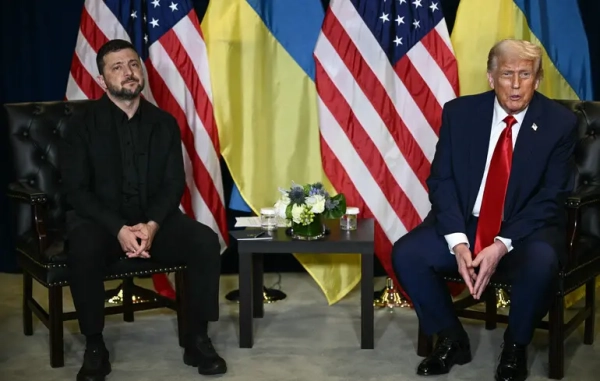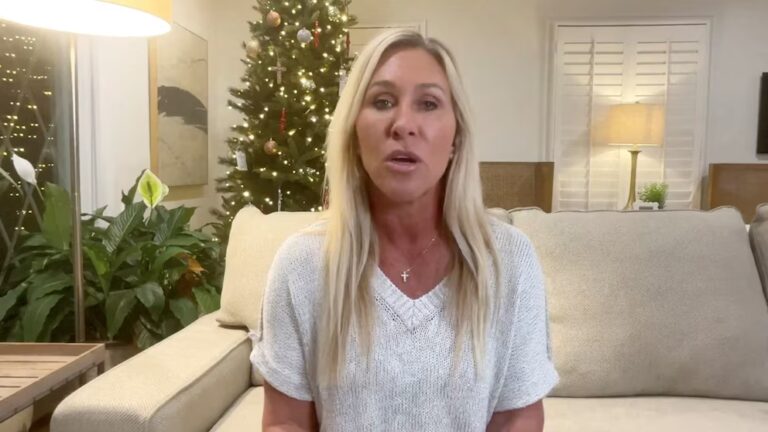
And in tweet a few hours later, Trump wrote, “Will be making a decision soon on the appointment of new Chief Economic Advisor. Many people wanting the job – will choose wisely!”
In his own statement, Cohn said: “It has been an honor to serve my country and enact pro-growth economic policies to benefit the American people, in particular the passage of historic tax reform. I am grateful to the President for giving me this opportunity and wish him and the Administration great success in the future.”

Chris Kleponis-Pool/Getty ImagesPresident Donald Trump and National Economic Council Director Gary Cohn affirm their support for each other at Camp David on Jan. 6, 2018 in Thurmont, Md.
Vice President Mike Pence tweeted of Cohn’s resignation on Tuesday night, “Gary Cohn did a great job as @POTUS’s Director of the National Economic Council – helping pass the largest tax reforms in U.S. history, cutting job-killing regs & spurring our economy. Thank you Gary for your tireless work on behalf of the American people.”
Sen. Jeff Flake, R-Ariz., also took to Twitter, writing, “Gary Cohn has been a seasoned, steady voice on trade policy at the White House. He will be missed.”
Cohn’s departure marks the sixth high-profile administration loss this year alone, the most recent last week when longtime Trump aide and communications director Hope Hicks announced she was leaving.
Trump’s staff turnover so far has been record-setting – more than triple that of the Obama administration and double that of the Reagan White House, according to a recent study by the Brookings Institution.
Cohn was on the cusp of quitting last summer after Trump’s infamous “very fine people on both sides” comment likening white supremacists to counter-protesters in Charlottesville, Va.
Earlier Tuesday, Trump hinted that there might be more departures from his White House, but pushed back on reports staffers are unhappy.
“I read where, oh, gee, maybe people don’t want to work for Trump – and, believe me, everybody wants to work in the White House,” Trump said at a joint news conference with Sweden’s prime minister.
“They all want a piece of that Oval Office. They want a piece of the West Wing. And not only in terms of it looks great on their resume, it’s just a great place to work.”
Trump added that it can be a tough place to work. “I like conflict. I like having two people with different points of view, and I certainly have that. And then I make a decision. But I like watching it. I like seeing it, and I think it’s the best way to go. I like different points of view. But the White House has a tremendous energy and we have tremendous talent.”
“Yes, they’ll be people — I’m not going to be specific — but there will be people that change — they always change. Sometimes they want to go out and do something else but they all want to be in the White House,” Trump said.

Alex Wong/Getty ImagesDirector of the National Economic Council Gary Cohn listens during a meeting between President Donald Trump and congressional members in the Cabinet Room of the White House, Feb. 13, 2018 in Washington.
Cohn’s exit comes as little surprise after his week-long trade policy dispute with the president, who announced last week, over Cohn’s objections, that he would impose steep tariffs on imported steel and aluminum imports.
Cohn, who has been the leading voice within the administration opposing the tariffs, had planned to arrange a meeting at the White House this week between the president and executives of companies that would be hurt by the tariffs, but that meeting was called off, sources familiar with the matter tell ABC News.
Last week, surrounded by steel and aluminum executives in the White House, the president made an impromptu announcement that he intends to impose a 25 percent tariff on steel imports, and 10 percent on aluminum imports. He said the tariffs were still being finalized and that he’d formally enact them this week.

Andrew Harrer/Bloomberg via Getty ImagesGary Cohn, director of the U.S. National Economic Council, walks toward Marine One on the South Lawn of the White House in Washington, July 5, 2017.
The decision caught many in the president’s party and in his own administration by surprise.
Though the tariffs have not been finalized, the president has said he’s not backing down from his decision to impose tariffs and expressed optimism that it won’t spark a trade war.
“I don’t think we’re going to have a trade war,” Trump said Monday. At a press conference Tuesday, he claimed a trade war, if it were to happen, would be bad for the other countries, not the United States.
Sourse: abcnews.go.com






